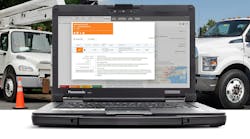COMPANY:
Bridgestone/Firestone
North American Tire LLC,
Nashville, TN
OPERATION:
Operation: Private carrier
Ron Tartt, general manager,
private fleet
Problem:
Bridgestone/Firestone has always used some form of mobile communication and tracking system for its private fleet. Yet its needs have changed substantially over that time, says Ron Tartt, general manager of the private fleet. It now operates 300 tractors and 600 trailers, delivering tires and automotive parts to more than 4,000 customers nationwide, including company stores, independent tire dealers, mass merchandisers and wholesale clubs. In addition, the fleet hauls raw materials to a manufacturing location, tires from company plants to distribution centers, and carries loads for other shippers under its for-hire operating authority.
“We needed a tool to help us manage our fleet better, going beyond the basic mobile communication package that lets us talk to drivers and plot where our trucks are,” Tartt says. “We needed a system that would help us reduce our cost of operations and cut down on driver paperwork, yet make us more productive and responsive to customer needs.” The ability to pinpoint delivery times, he notes, is especially important.
Solution:
Bridgestone/Firestone decided on PeopleNet's Internet-based g2 and recently updated g3 communication and tracking system for its private fleet, and hopes to have it installed on all vehicles by the end of this year.
“Our core goals are pretty straightforward: Use the system's electronic logbook feature so our drivers don't have to fill out paper logs anymore…and use its electronic fuel tax reporting function so drivers don't have to fill out trip reports every time they cross a state line,” says Tartt. “Each of those features alone should help us be much more productive simply because our drivers don't have to deal with paperwork anymore and can concentrate on just driving.”
The next step is to use the PeopleNet system to help automate the driver payroll. “We have some 350 drivers being paid by the mile, the hour, the stop, etc.,” Tartt says. “Automating all of that will make us much more efficient and accurate.”
Tartt also wants to branch out into other areas, especially when it comes to on-time delivery rates.
“We want to be able put the tracking data we get into context, to help us locate bottlenecks or delays so we can be more proactive,” he explains. “If they are on time, we don't want to know about it, but if the system calculates that — in terms of distance to be covered and current road speed of the vehicle — they might be delayed, we want to be notified so we can start responding to the problem before the customer is aware of it.”
Eventually, Tartt hopes to gain the ability to go completely paperless, getting electronic signatures on electronic bills of lading, and sending customers proof of delivery (POD) notices electronically as well.


